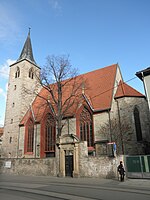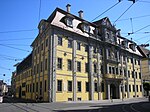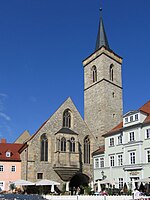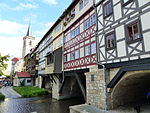Erfurt (German pronunciation: [ˈɛʁfʊʁt] (listen)) is the capital and largest city in the Central German state of Thuringia. It is located in the wide valley of the Gera river (progression: Gera→ Unstrut→ Saale→ Elbe→ North Sea), in the southern part of the Thuringian Basin, north of the Thuringian Forest. It sits in the middle of an almost straight line of cities consisting of the six largest Thuringian cities forming the central metropolitan corridor of the state, the "Thuringian City Chain" (Thüringer Städtekette) with more than 500,000 inhabitants, stretching from Eisenach in the west, via Gotha, Erfurt, Weimar and Jena, to Gera in the east. Erfurt and the city of Göttingen in southern Lower Saxony are the two cities with more than 100,000 inhabitants closest to the geographic center of Germany. Erfurt is located 100 km (62 mi) south-west of Leipzig, 250 km (155 mi) north-east of Frankfurt, 300 km (186 mi) south-west of Berlin and 400 km (249 mi) north of Munich.
Erfurt's old town is one of the best preserved medieval city centres in Germany. Tourist attractions include the Merchants' Bridge (Krämerbrücke), the Old Synagogue (Alte Synagoge), the oldest still standing synagogue in Europe, Cathedral Hill (Domberg) with the ensemble of Erfurt Cathedral (Erfurter Dom) and St Severus' Church (Severikirche) and Petersberg Citadel (Zitadelle Petersberg), one of the largest and best preserved town fortresses in Central Europe. The city's economy is based on agriculture, horticulture and microelectronics. Its central location has made it a logistics hub for Germany and central Europe. Erfurt hosts the second-largest trade fair in eastern Germany (after Leipzig), as well as the public television children's channel KiKa.
The city is situated on the Via Regia, a medieval trade and pilgrims' road network. Modern day Erfurt is also a hub for ICE high speed trains and other German and European transport networks. Erfurt was first mentioned in 742, as Saint Boniface founded the diocese. Although the town did not belong to any of the Thuringian states politically, it quickly became the economic centre of the region and it was a member of the Hanseatic League. It was part of the Electorate of Mainz during the Holy Roman Empire, and later became part of the Kingdom of Prussia in 1802. From 1949 until 1990 Erfurt was part of the German Democratic Republic (East Germany).
The University of Erfurt was founded in 1379, making it the first university to be established within the geographic area which constitutes modern-day Germany. It closed in 1816 and was re-established in 1994, with the main modern campus on what was a teachers' training college. Martin Luther (1483–1546) was its most famous student, studying there from 1501 before entering St Augustine's Monastery in 1505. Other noted Erfurters include the medieval philosopher and mystic Meister Eckhart (c. 1260–1328), the Baroque composer Johann Pachelbel (1653–1706) and the sociologist Max Weber (1864–1920).












